This year, we found ourselves in the midst of a global pandemic and great uprisings— and we were part of helping create unprecedented change in the U.S. and globally. Learn more about what you made possible.
Kick Big Polluters out and make them pay
You are drying up business for water privatizers in the U.S.
You expose a powerful food and soda industry group
You enable us to rise to the moment
Kick Big Polluters out and make them pay
More than a rallying cry—it’s a movement for justice that you are helping to grow
At the most recent negotiations of the global climate treaty, against all odds, your support ensured that Big Polluters’ agenda was stymied.
Corporate Accountability organizes toward what is necessary, not what seems most feasible. Over the course of this campaign, we have partnered with allies to raise the call to kick Big Polluters out of climate policy and make them pay for the harms they cause. We persevered while those in power told us it was impossible. Together we have helped usher a new era in organizing for climate justice. And there’s much more work to be done.
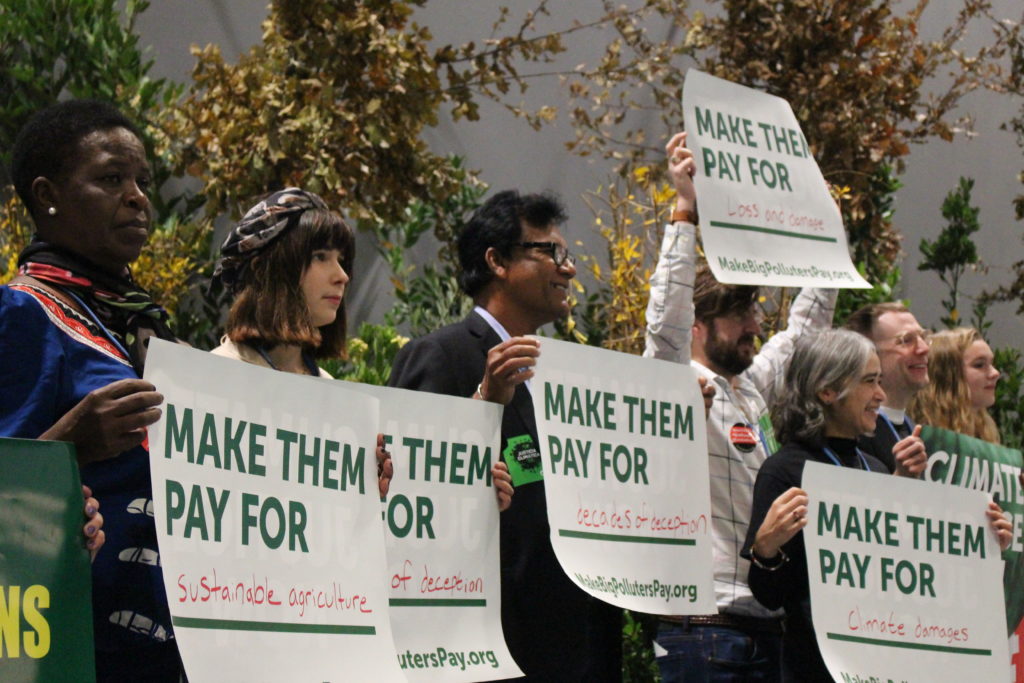
At the most recent negotiations for the U.N. climate treaty, people around the world took up the demand to make Big Polluters pay for their role in the climate crisis.
Learn more on how we partnered with organizations to advance climate justice at the U.N. treaty negotiations.
Visit MakeBigPollutersPay.org/Act to learn about the next phase of this campaign.
You are drying up business for water privatizers in the U.S.
Years of water justice victories are impacting Veolia North America.
This year, one of the world’s largest water privatizers, Veolia, lost a whopping $400 million contract renewal with the city of Wilmington, Delaware. This loss was directly tied to local concerns about the corporation’s abuses in Flint and Pittsburgh—abuses you helped shine a bright light on.
Following years of other shakeups for the North America division of Veolia, the loss of the Wilmington contract is a clear signal that Veolia’s hopes of cornering the U.S. water market are dwindling quickly. It’s also a sign that policymakers are waking up to what people like you have known all along: Veolia cannot be trusted to fix our cities’ water woes.
This exciting development for the human right to water could not have happened without people and organizations around the country campaigning for almost a decade to expose the abuses of Veolia and promote public water solutions. The pressure you helped generate supported communities around the country to successfully defeat Veolia’s efforts to take over U.S. water systems. In the face of these defeats, the corporation ended a contract model it had staked its hopes on—not to mention spent millions of dollars on—as a way to make inroads in our public water systems. Soon after, the North America CEO abruptly departed.
How were we able to collectively make such an impact on the largest water privatizer in the world? By working closely with allies and people like you. The water justice movement is larger than any one of us, and it’s what is going to ensure that one day, all cities and towns will no longer be threatened by the specter of water privatization.
What follows is an overview of the hard-hitting campaigning you helped make possible—from the launch of our campaign to this year’s victory.
The threat of water privatization
When we began our campaign to challenge corporate control of water, Veolia had its eye on the U.S. as an expansion market. Decades of policies designed to gut government in the U.S. had left towns and cities without the funds to improve and maintain water systems. Corporations like Veolia and Suez were swooping in to capitalize on this situation.
But examples around the world and in the U.S. showed clearly that privatizing public water systems was not the solution people need. Far too often, water privatization means:
- Sky-high rate hikes and shutoffs
- Cost-cutting measures that jeopardize water quality and people’s health.
- Failure to meaningfully invest in maintaining, improving, or expanding infrastructure, especially in communities deemed “unprofitable.”
- Labor abuses and layoffs.
And to this day, both globally and in the U.S., the negative impacts of water privatization disproportionately affect Black communities, other communities of color, and low-income communities.
So we designed our campaign to challenge these abuses, particularly those committed by industry leaders. And it is in this context that we continue to expose Veolia’s abuses and organize with communities to counter the threat that Veolia poses.
Campaigning to counter the threat
We began by publishing reports and earning media that shined the spotlight on the harms of water privatization as a whole and Veolia’s abuses in particular, as well as the need for robust public water investment. We also made the case for equitable and democratic public solutions to our water challenges. With these examples in hand, we became a trusted resource for mayors who are often the critical decision-makers when it comes to privatization.
We also campaigned with local allied organizations to successfully prevent Veolia from securing contracts, such as in St. Louis, Missouri and Baltimore, Maryland. And members like you played a critical role in mobilizing around the country to bring this issue to public attention.
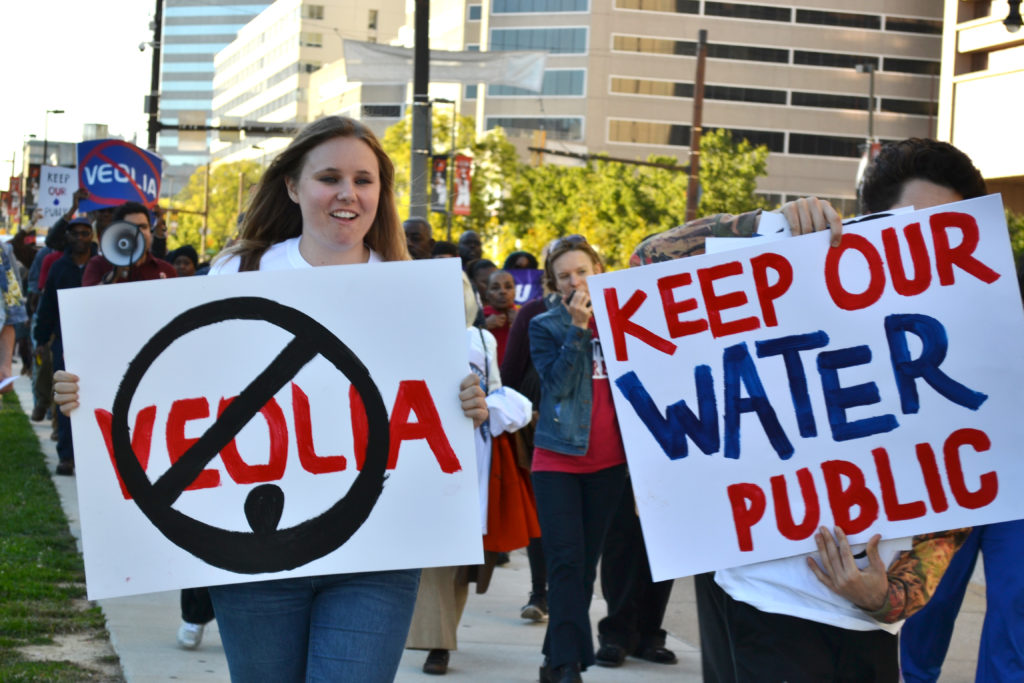
In 2014, Corporate Accountability supported the One Baltimore United coalition to successfully stop a Veolia contract in Baltimore, Maryland. Pictured: Campaign Director Lauren DeRusha.
Then, in 2015, the lead crisis in Flint, Michigan began making headline news. The residents of Flint, most of whom are Black, were being poisoned by their water, as a result of the racist and unaccountable emergency management system controlling the water system.
Our organizers traveled to Flint to learn more about the situation. There, we began building a lasting relationship with Flint Rising, a community-led grassroots organization. They were not only serving the immediate needs of their neighbors but also organizing to demand accountability for the crisis. As the situation developed, it be came clear that it was not just the state of Michigan that needed to be held accountable—it was also Veolia. And that’s where we were able to most deeply support Flint Rising’s work.
Through our research, we learned that Veolia had a consulting contract in Flint during the time when residents were already sounding the alarm about the water quality.
Shortly after, we also learned about the lead crisis in Pittsburgh, which had been under contract with Veolia.
In both Flint and Pittsburgh, local allies led the way to hold both government officials and Veolia accountable. From street actions to media exposure to direct organizing with public officials, we and our allies helped to shape the public climate, decisively demanding action by decision makers.
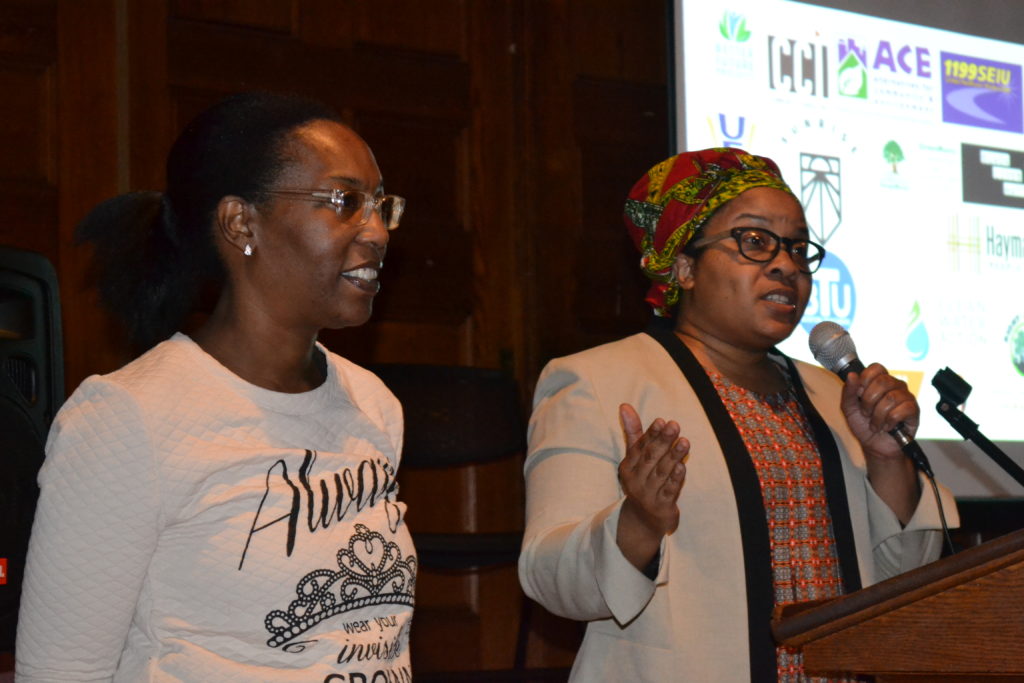
Flint organizers are determined to hold the government and corporations accountable for the continuing crisis in their city—and Corporate Accountability is inspired to partner with them. Pictured: Flint Rising organizer Gina Luster (L) and Director Nayyirah Shariff (R) at an event in Boston.
Media exposure key to shifting the landscape for Veolia
In particular, the media we earned together played a pivotal role in exposing the reality of Veolia’s abuses. This exposé in the Guardian was especially damning, as it demonstrated that Veolia executives discussed the potential for lead in Flint’s water and did not make these concerns known to the public.
All told, Veolia’s role in the lead crises in Flint and Pittsburgh would have not come to light in this way if not for our joint work, following the lead of local allies in Flint and Pittsburgh.
In fact, the industry publication “Global Water Intelligence” reported that Veolia’s failure to renew its Wilmington contract “exemplifies the long shadow that the lead contamination crises in Flint and Pittsburgh have cast on [Veolia’s] North American contract operations business.” The publication went on to indicate that the whole industry “feels the pain” of the public airing of one corporation’s track record.
Veolia a “shell” of itself
Thanks to the support of members like you and the dogged organizing of allies on the frontlines of Veolia’s abuses, the corporation that once confidently looked to North America as its next huge market for water privatization is now described as a “shell of what it was a few years ago,” according to Global Water Intelligence. The publication also speculated that water privatization no longer seems to be the focus of Veolia or Suez’s strategic direction for the coming years.
And you can be sure that what happens with the two industry leaders will affect the rest of the industry. As Global Water Intelligence put it, “everything in water is about to change.”
Of course, we won’t stop until that change is permanent, and puts people and the planet first. We won’t stop until Veolia—and the rest of the industry—gets the cold shoulder everywhere in the world, and communities have access to tools, means, and resources to keep water systems under democratic, equitable, and public control. We won’t stop until the human right to water is no longer under threat by water privatizers.
But for now, we’re celebrating with you, our members, and our allies. The impact we have had, together, on this corporation, is remarkable. It took all of us to make it happen, and it will take all of us to continue forward until victory.
You expose a powerful, shadowy industry group
Report pressures Big Food and Soda corporations
What are the health effects of sugary drinks on growing children? What are the best policies to protect people from developing diabetes, having heart attacks, or contracting other food-related diseases? Why are children, especially in Black, Indigenous, and other communities of color, continuing to be targeted by junk food and sugary drink advertising?
We’d like to think that such basic questions about our health are considered carefully by government agencies charged with creating nutrition policy. We’d hope such policies are created in conversation with scientists and experts who have our health as their first priority.
But today’s reality is that Big Food and Soda corporations are exerting as much influence as they can over policy makers. They want to peddle harmful products with impunity—products that are making children and adults sick around the world. And to do so, they’re taking a page from the playbooks of Big Tobacco and Big Polluters: muddle the science, confuse the public, and get representatives at the policymaking table.
That’s why exposing the “shadowy industry group” known as the International Life Sciences Institute (ILSI) is one of the most effective way to stop corporations like Coca-Cola, PepsiCo, and McDonald’s from advancing their junk food agenda. And that’s exactly what we embarked on this year in close partnership with allies around the world who are leading campaigns against Big Food and Soda’s political influence in their countries.
Challenging Big Food’s abuses in the Global South
Started four decades ago by a former Coca-Cola executive, ILSI is a Washington D.C.-based industry group with 15 affiliated chapters around the world. Since the start, ILSI has been pushing junk science and peddling political influence for corporations like Coca-Cola, PepsiCo, DuPont, Bayer-Monsanto, and McDonald’s. It’s the Big Food equivalent of the Tobacco Institute or American Petroleum Institute.
As such, ILSI is dedicated to advancing industry interests that often undermine environmental and public health protections on the behalf of some of the world’s biggest polluters, public health menaces, and labor rights abusers.
And no one is more impacted by this kind of political influence than people in the Global South; low-income communities; and Black, Indigenous, and other communities of color. Racism, colonialism, and extractive capitalism have created conditions that burden these communities with the highest and most rapidly accelerating rates of diet-related disease, not to mention severe impacts of other “externalities” like mountains of plastic waste, depleted water tables, and toxic pesticide exposure.
Which is why organizers from these communities have been exposing and challenging the political influence of the Big Food and Soda industry for years. And why we teamed up with some of these allies this year like Educar Consumidores from Colombia, HEAL Alliance, Fight for $15, and others in a wave of actions to isolate and discredit ILSI.
A scathing exposé pressures Coca-Cola and PepsiCo
In the spring, we released “Partnership for an Unhealthy Planet,” a scathing exposé on ILSI that garnered headlines from The New York Times to the British Medical Journal. The report has also moved more than 70,000 people and nearly 40 organizations to demand Coca-Cola, PepsiCo, and other corporations drop ties with ILSI and other front groups producing junk science.
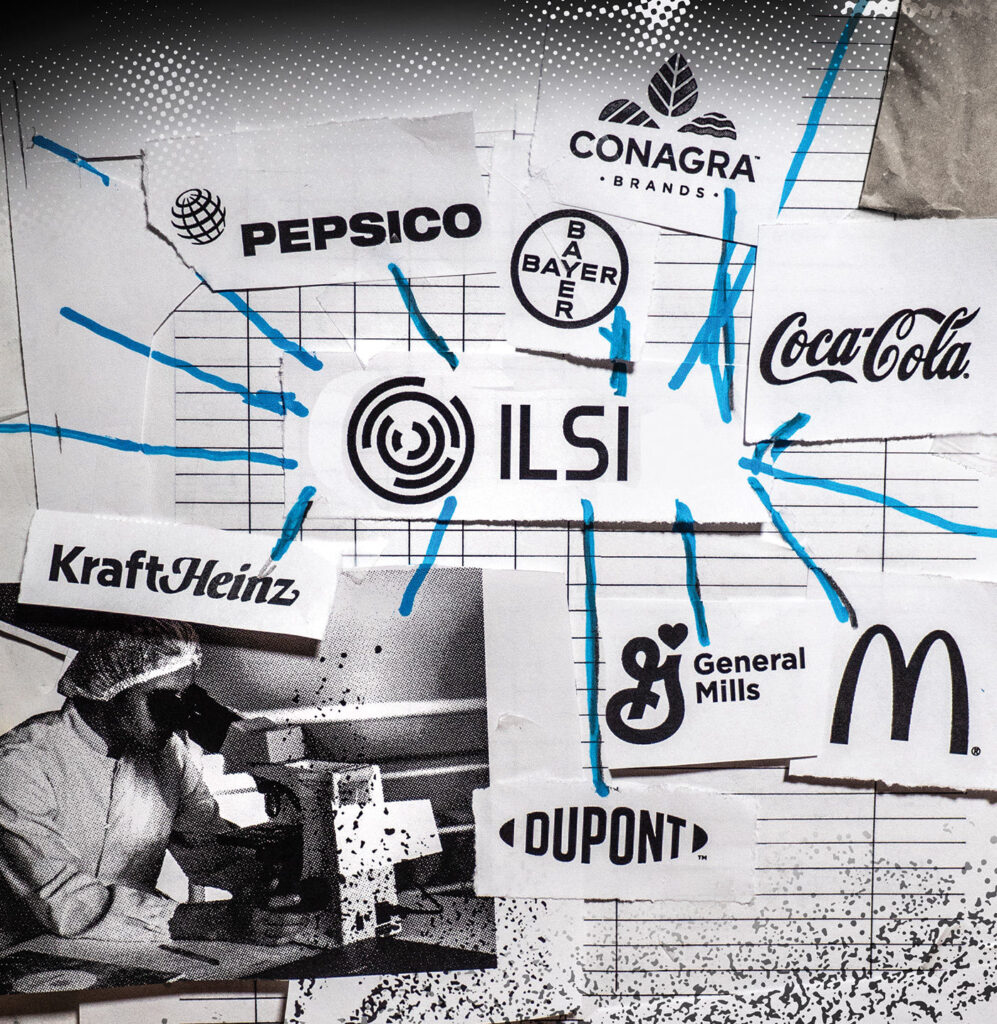
More than a dozen Big Food and Big Soda corporations rely on ISLI to shape nutrition policies geared at protecting profits, at the expense of people’s health worldwide.
And, with our allies, we delivered these demands to Coca-Cola and PepsiCo in tandem with their shareholders’ meetings. At the meetings, we jointly brought the findings of the report to executives and highlighted the human toll wrought by their, and ILSI’s, interference in public health policy.
At the PepsiCo meeting, for example, Dr. Yolandra Hancock delivered a stirring, personal statement about the devastating impacts Big Soda has on children’s health in Black, Indigenous, and people of color (BIPOC) communities. Dr. Hancock is a D.C.-based public health advocate with the #DontMuteMyHealth campaign, a pediatrician by training, and an expert on the issues of sugar and its role in disease causation.
Organizing toward a nourishing future
It’s through actions like this that we generate public outcry and apply pressure on abusive corporations. With our allies, we are forcing Big Food and its front groups to spend time and money protecting brand and image, making it more difficult for them to conduct business as usual.
In fact, just days after we released our report on ILSI, the ILSI Research Foundation changed its name. We can only wonder if this were a strategic attempt by ILSI to distance itself from our findings. In any case, this is a sign of huge impact.
Your support is enabling this hard-hitting work. Together, we are making it increasingly difficult for Coca-Cola, PepsiCo, McDonald’s, and the food and beverage industry to propagate junk science and interfere in politics with impunity. We’re building the political will to rein in corporate power over the most basic aspects of our lives, like what we eat. And we’re keeping the long-term goal in our vision: a world where communities and families have access to healthy food and control over food system that nourishes all.
You enable us to rise to the moment
Rapid response during the pandemic and uprisings for Black liberation.
In March, the world was turned upside down as the COVID-19 pandemic hit. In the U.S., Black and Indigenous people, people of color, service workers, and low-income communities were disproportionately affected. Your support enabled us to face this challenging moment with a mindset of abundance and creativity.
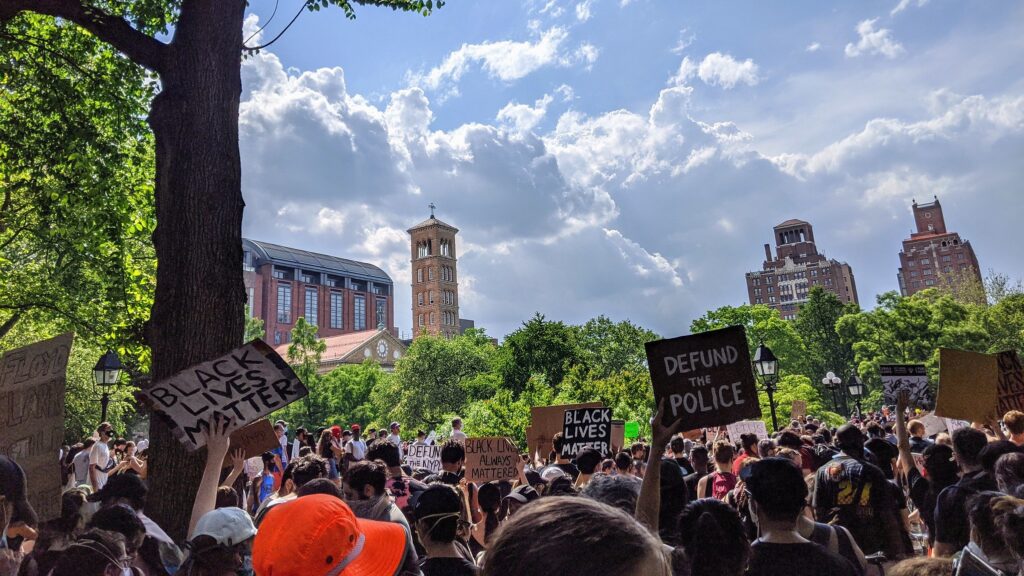
Thanks to members like you, we were able to adjust our campaign plans for maximum impact in these changed conditions. Throughout the spring and summer, we engaged in rapid and necessary campaigning in response to conditions created by the pandemic and attempts by corporations to exploit the crisis. And when people across the country followed the lead of Black organizers to demand systemic change, your support enabled us to respond with action once again.
Challenging water shutoffs and unaffordable service
Almost as soon as the pandemic reached the U.S. we began strategizing with our allies on where we all needed to focus our organizing power. We quickly identified that it was essential to stop shutoffs of water and other essential utility services in the short term, and to advance a long-term framework for water service affordability and debt forgiveness.
To deny people the ability to wash their hands, refrigerate food, or run home medical equipment is inhumane and dangerous, especially during a pandemic. And, like much else in the pandemic and otherwise, those who are most impacted by shutoffs and the ensuing economic crisis are Black and Indigenous communities and other communities of color.
The “No Shutoffs” coalition, whose members also include Partnership for Southern Equity, Center for Biological Diversity, Food & Water Action, and dozens of local organizations, succeeded in moving many municipalities to temporarily stop shutoffs. As a coalition, we organized hundreds of thousands of people across the country to call on their elected officials to issue halts to shut offs and provide long term relief. Engaged by virtual town halls and action briefings, email outreach, and more, many activists and members like you took action.
This kind of grassroots pressure moved congressional champions to put our demands front and center in their platforms for pandemic response. And these policymakers now have the backing of hundreds of thousands of people as they continue to go toe to toe with those who are opposing these necessary protections.
But we and our allies took this opportunity to ask: why should people’s access to clean water and other utilities ever be denied? Access to water is a fundamental human right and shouldn’t hinge on the ability people to pay their water service bills.
So we are continuing to work in coalition to advance legislation that invests in the country’s public water infrastructure and focuses on making water service affordable for all (the WATER Act).
Exposing Philip Morris International’s pandemic exploitation
It wasn’t surprising, but was enraging that corporations sought to exploit the crisis of the pandemic. Tobacco giant Philip Morris International (PMI) was among the ranks of these unscrupulous corporations, seeking to profit from the pandemic with misinformation. Knowing that corporations would attempt all manner of abuse during this time, we diligently monitored suspicious actions.
We found that PMI and its front groups were attempting to position vaping as a way to stay safer in the time of COVID-19. Vaping products (also known as heat-not-burn or e-cigarettes) are the industry’s latest attempt to push a nicotine product to addict people for life. With flavors and social-media appeal, these products are targeted at youth, Black people and other people of color, and increasingly, people in the Global South.
We researched the doctors and bloggers who were issuing misinformation about vaping. It turns out they have ties to the Foundation for a Smoke-Free World—of which PMI is the sole funder—and other front groups pushing a pro-vape agenda amid the respiratory pandemic.
Your support enabled us to expose these connections in a hard-hitting article we secured in Bloomberg News.
And we were heartened when, a few weeks later, the secretariat of the global tobacco treaty, Dr. Adriana Blanco Marquizo, released a powerful statement that called out the industry’s strategy. Dr. Blanco reminded governments that they can and should use Article 5.3 of the treaty—which our and our allies’ organizing helped secure in the early 2000s—to protect public health from the vested interests of the industry.
Supporting the uprisings for Black liberation
As the pandemic continued, it became clear that Black people in the U.S were disproportionately contracting COVID-19 and dying from it. This tragedy laid bare the ways that systemic anti-Black racism threatens the lives and wellbeing of Black people—from environmental injustice to racism in the health care system and beyond.
When George Floyd was brutally murdered by police, Black people led the way in demanding systemic change. And many people of all races were activated to take up the call, join the protests, and take action in defense of Black lives.
The Movement for Black Lives, a national organization that has been organizing for systemic change for years, asked the progressive left to step up, support, and follow their leadership during the Juneteenth days of action. The demands for these days of action were: Defund the police. Invest in Black communities. Trump must resign.
Corporate Accountability supported this week of action by organizing members to get involved and donate to the Movement for Black Lives. We also provided support through media training, research, and text banking. And we amplified the Movement for Black Lives’ demands and actions on our social media channels.
Following the Juneteenth days of action, activists and organizers pressured elected officials on local, state, and national levels to enact systemic solutions. Many city officials felt the pressure to make commitments around cutting police budgets and investing in services that support, rather than criminalize, Black communities.
For the most part, responses from elected officials were not enough. But we know the road to systemic change is long and not linear. And there can be no denying that Black organizers successfully launched an evolutionary leap forward toward a future where Black people thrive. Corporate Accountability will continue to organize to support the Movement for Black Lives and other Black allies toward that future.
Keeping our focus on our mission
The social and economic structures we live under are not tenable. They have been created to benefit a small handful of people—mostly white men—and corporate power plays a significant role in both upholding and benefiting these structures. This spring, the cracks in these structures grew larger and more people began to see them.
Corporate Accountability’s mission—to stop life-threatening abuses by transnational corporations—requires nothing short of transformative change. So we are ready for these times. And we are able to respond nimbly and effectively because the bulk of our funding comes from members like you.
We can only imagine that the future will continue to bring unprecedented upheavals. And we know we will be equipped to respond to them in partnership with you and our allies, keeping a steady focus on our mission, ready to mobilize people power, and building toward a future that supports life, justice, and the well-being of all.


